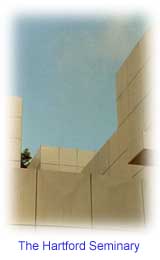
|

|

Jewish World Review / May 14, 1998 / 18 Iyar, 5758
Jonathan S. Tobin
SOMETIMES YOU HAVE TO ROAM far from home to solve a puzzle in your own
backyard. That's why those seeking to make sense of a local controversy that
is rocking the interfaith community in Connecticut might do well to ponder
the role of a university in Beirut as much as happenings at a seminary in
Hartford.
The controversy in question is the storm brewing over an article published
in the Hartford Courant's Israel at 50 supplement. In it, the Rev. Barbara
Brown Zikmund, the president of the Hartford Seminary, a Protestant theological
college, blasted Zionism and Jewish loyalty to Israel.
In stark terms that bore no alternative interpretation, Zikmund said in an
article entitled "The Future Requires Repentance," that "the very existence"
of Israel "has violated the lives of Arab peoples, both Christians and
Muslims." She called on Israel and the Jewish people to repent of Zionism
and its crimes even as she posited a moral equivalence between the Arabs who
For those who have followed the history of the Hartford Seminary, such
expressions of contempt for Jewish values, Jewish history and the right of
the Jewish people to a state in their historic homeland, should come as no
surprise. For the past century, the Seminary had been a bastion of
Protestant outreach to the Arab world and consequently a citadel of anti-Zionism.
Yet local Jews were still shocked and outraged by Zikmund's tirade because
it had been under her leadership that the Seminary had publicly changed course
and reached out to the Jewish community. It became a center of interfaith
efforts and even co-sponsored an ongoing scholarly forum for study of the
"Abrahamic religions" to bring Christians, Jews and Muslims together. The
Seminary now has many Jews among its contributors and 2 leading local Jewish
figures on its Board of Directors.
Why then, would the leader of the Seminary endanger the financial well-being
of her institution in a moment of candor?
In part, the answer can be found in a recent volume published by one of the
most astute observers of the Arab world, Fouad Ajami of Johns Hopkins
University. Ajami, who grew up in a Shiite village in Lebanon, is the rare
sort of scholar who can write readable books about politics and literature,
appear on television to comment on events and yet retain his standing in the
academic community.
But, as Ajami explains, a center of Arab thought in the 20th century has
been an American Protestant institution: the American University of Beirut. It
has been there (and its counterpart in Cairo), that Arab intellectual elites
have come to imbibe the spirit of Arab nationalism. In its al-Urwa al-Wuthqa,
"the Close Bond," a group Ajami describes as "a gathering of students and
teachers drawn from the full range of Arab countries at the American University of
Beirut," Nasserism and hatred for Israel was nurtured.
The irony was that the Protestant missionaries who came to AUB from places
like the Hartford Seminary were as much influenced by their students as
their students were by them. Thus, it is no surprise that institutions like the
Hartford Seminary would become, in its own way, as anti-Zionist as any
college in the Arab world.
The point that Ajami makes over and over again as he examines the various
ideological trends which have swept over the Arab world since 1948 — from
Nasserism which led to the defeat of 1967 to the rise of Islamic
fundamentalists and Saddam Hussein — is that they have all led to disaster.
They have diverted the energy and the intellectual gifts of the Arab world
into the sterile pursuit of the destruction of Israel. The result has been a
region wracked by poverty, economic stagnation and political tyranny.
These "dream palaces," the Arab and American Protestant intellectuals of
Beirut helped construct have become prisons from which the Arab peoples
struggle in vain to escape.
That's why the virus of anti-Zionism, which has now reappeared in the
writing of Barbara Brown Zikmund, is so dangerous.
There was a time, not so very long ago, when the very idea of Jews gaining
power in the land of the Bible was widely seen as an offense against the
very premise of Christianity. But in recent years, the cause of interfaith
understanding has done much to cut away these theological underpinnings of
Jew-hatred. Fortunately, men and women of good faith such as Pope John Paul
II have ended this "teaching of contempt" and we know live in a time when
Jewish and Christian believers can engage in dialogue in an atmosphere of mutual
respect.
But in certain precincts of the theological academic world, the teaching of
contempt is obviously not quite dead. It may be, that under the weight of
the general public outcry and the understandable dismay of her own Board of
Directors (who stand to lose considerable financial support if they do not
nip this crisis in the bud), Zikmund will eat crow and back away from her essay.
But whatever she is forced to say now to cover her vulnerable backside, the
Seminary president has shown her true colors for all to see.
Rev. Zikmund and her ideological brethren in such virulently anti-Israel
groups like the National Council of Churches (who routinely attack Israeli
sovereignty in Jerusalem), are still living in the intellectual "dream
palaces" of their own construction where Israel is an intolerable offense
against Christianity and the Arab people.
That's why Zikmund's statement provoked so much justified outrage among
local doves to whom interfaith outreach is second nature. They know that as long
as people like Zikmund are in positions of influence in Christian educational
institutions, interfaith outreach is imperiled.
Fouad Ajami teaches that those who embrace these ideologies which trade on
contempt for Israel, ultimately lead their followers to destruction. Just as
the American University of Beirut was tragically ravaged by a Lebanese Civil
War that its own graduates helped foment, Rev. Zikmund is now being laid low
by her own words. That and not Zikmund's dream of a de-Zionized Middle East,
is the inexorable logic of
 The ‘dream palace' of the anti-Zionists:
Hartford Seminary controversy has historic roots
The ‘dream palace' of the anti-Zionists:
Hartford Seminary controversy has historic roots
 have suffered in the course of the Arab world's war to exterminate the Jewish
state and Jewish victims of the Nazi Holocaust. She even went so far as to say
that "Jew need to let go of the idea that a Jewish state located in a physical
place is crucial to Jewish identity."
have suffered in the course of the Arab world's war to exterminate the Jewish
state and Jewish victims of the Nazi Holocaust. She even went so far as to say
that "Jew need to let go of the idea that a Jewish state located in a physical
place is crucial to Jewish identity."
Understanding Arab and Seminary culture
In his latest book, The Dream Palace Of The Arabs: A Generation's Odyssey
(Pantheon, 1998), Ajami  traces the last half century of Arab intellectual
thought through the work of its writers and poets. A dazzling tour-de-force
of literary criticism and history, The Dream Palace is must reading for
anyone who wishes to truly understand the culture of Lebanon, Egypt and the
Palestinians as well as the impact of figures such as Nasser and Saddam
Hussein. He details how Arab thinkers have struggled with the crisis of
their world's encounter with modernity and how it has led to exile and despair for
many of their greatest writers.
traces the last half century of Arab intellectual
thought through the work of its writers and poets. A dazzling tour-de-force
of literary criticism and history, The Dream Palace is must reading for
anyone who wishes to truly understand the culture of Lebanon, Egypt and the
Palestinians as well as the impact of figures such as Nasser and Saddam
Hussein. He details how Arab thinkers have struggled with the crisis of
their world's encounter with modernity and how it has led to exile and despair for
many of their greatest writers.
Without Zionism, Jews are defenseless
Those who decry the existence of a Jewish state in the Land of Israel are
calling for a return to the pre-1948 era when Jews were powerless and thus
vulnerable to the persecutions of any tyrant or mad ideologue who saw them
as a convenient scapegoat. The history of the two millennia of Jewish exile was
written in blood and sorrow. To say that the Jewish people have no right to
their own state is to invite a repetition of that history. Zikmund's
position leads inevitably to the idea that the Jews are a pariah people, undeserving
of the same rights as every other nation.
Future of outreach is at stake
Just like the generations of students at the American Universities in Beirut
and Cairo, who were taught the true faith of Arab nationalism, people like
Zikmund have condemned themselves to irrelevancy. Despite logic and
political realities, in their hearts, they still nurture the fantasy of an end to the
Jewish state itself and not just the Israel of the Netanyahu government and
Likud.
JWR contributor Jonathan S. Tobin is executive editor of the Connecticut Jewish Ledger.